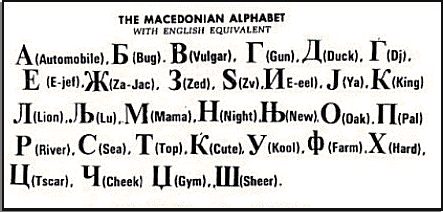MACEDONIAN POETRY
Welcome visitors | Macedonian heroes | Macedonian Poems | Zhelevo | Georgi | My Poetry | Articles | Documents | Makedonski Protesti | Interesting Articles | Macedonian Links | My Photos | My Pets | Comments & Jokes | Gerkoman prayer | The partition of Macedonia | THE MACEDONIANS

Macedonian Poems

MACEDONIAN LITERATURE
The first representatives of modern Macedonian literature made their appearance at the beginning of the 19th century. Joakim Krcovski and Kiril Pejcinovik introduced the ideas and sentiments of Enlightenment and rationalism. After them, the development of Macedonian Literature has been marked by the work of Dimitar and Konstantin Miladinov, Grigor Prlicev, and Rajko Zinzifov from the period of the middle of the 19th century. It was further developed in the 20th century by Vojdan Cernodrinski, Nikola Kirov - Majski and Atanas Razdolov.
Then the development of Macedonian Literature continued with Koco Racin, who is considered to be the founder of the modern literature. The first post-war generation of Macedonian poets, prose writers and playwrights included Blaze Koneski, Aco Sopov, Slavko Janevski, Vlado Maleski and Kole Casule.
The new generation of Macedonian writers which appeared in the early 1950s, encompassing among others Gane Todorovski, Mateja Matevski, Dimitar Solev, Ante Popovski, Boris Visinski and Simon Drakul is still very active today. They were followed by a wider group of talented authors, from which we can single out Zivko Cingo, Petre M. Andreevski, Radovan Pavlovski, Jovan Koteski e.t.c.

Tutunoberachite [ in Macedonian]
Bolen Dojchin [ in Macedonian ]
Teshkoto [ in Macedonian ]
Vezilka [ in Macedonian ]
in English
The Sirdar [ English ]
T'ga za jug [ in Macedonian ]
Longing for the South [ English ]
The Boundless Possibilities of Poetry
by
Milan Gjurchinov
b. 1928
Born in Belgrade. Aestethician and literary critic. Professor of Comparative Literature and Slavistic in University St. Kiril and Metodij in Skopje. Hi is the author of numerous books about the history of Macedonian and world literature. Author of several antilogies of Macedonian poetry and prose. Member of the Macedonian Academy of Sciences and Arts. Literary works: "Dostoevsky", "Pasternak", "Chekhov", "Contemporary Macedonian Literature" etc.
I believe that I am expressing a general opinion if I say that this first joint meeting of poets and critics from Macedonia constitutes a good reason to initiate discussion on the theme Poetry and Tradition, which we have selected as the subject of today's discussion. It will overcome the initial difficulties and locate and strike the real tone of the discussion, under the assumption that we speak openly, unconventionally, and sincerely, I think that we will succeed in creating a useful exchange of views and opinions - not so much about judgements and evaluations which we already have and which are at our disposal, but more about comprehension, about the possibilities in poetry, about poetry's role and function in the world in which we exist and which is real and indisputable only through inexhaustible contacts with the illusory past and traditions. On the other hand, confrontation of opinions about these essential relations before which stands boundless poetic creativity seems to be required also by the situation in our literary criticism, which in most cases is still daily appraising, exhausting itself in its educational-orientational mission and function and not concerning itself with the essential relations of poetry today - those which above all determine the rhythm of the poet's pulse and guide the poet's hand in realizing his poetic visions.
I believe that the majority of us - both those who are obviously skeptical about the contemporary poetic wave and also those who are very curious about it and, above all, display greater tolerance toward it - are able to agree that poetry, as a widely used means through which the intentions and insomnia of modern man become most directly evident, in a certain manner exceeds and dominates over other literary fields. Poetry represents the shortest and most direct way of expressing the intimacy and spirit of today's man, condemned to live in the face of the unknown and the incomparable, on the basis of his complexity, surroundings, and conditions. I will not here go into the genesis of this situation in poetry, which actually appeared long ago and which is also caused today by unavoidable historical circumstances. If we agree on the belief that the role of modern poetry in current times above all amounts to the confirmation and investigation of human possibilities, human beauty, and strength, and not to something greater than that, considering that the means and manners through which reality can be registered and presented are so developed and perfected today - we will agree that poetry is just that direct, acceptable, and irreplaceable instrument through which the immeasurable expanse of man's view and feelings of the world can be most adequately expressed. Here I would refrain from enumeration, at least of important names and movements which precisely in the domain of poetry so strongly marked the great epochs and dates in the development of modern literature. In essence, arguments for support of our assertions are located for us at arm's length: they are imposed precisely by the development of new literature and the important position the Macedonian poet occupies in that development.